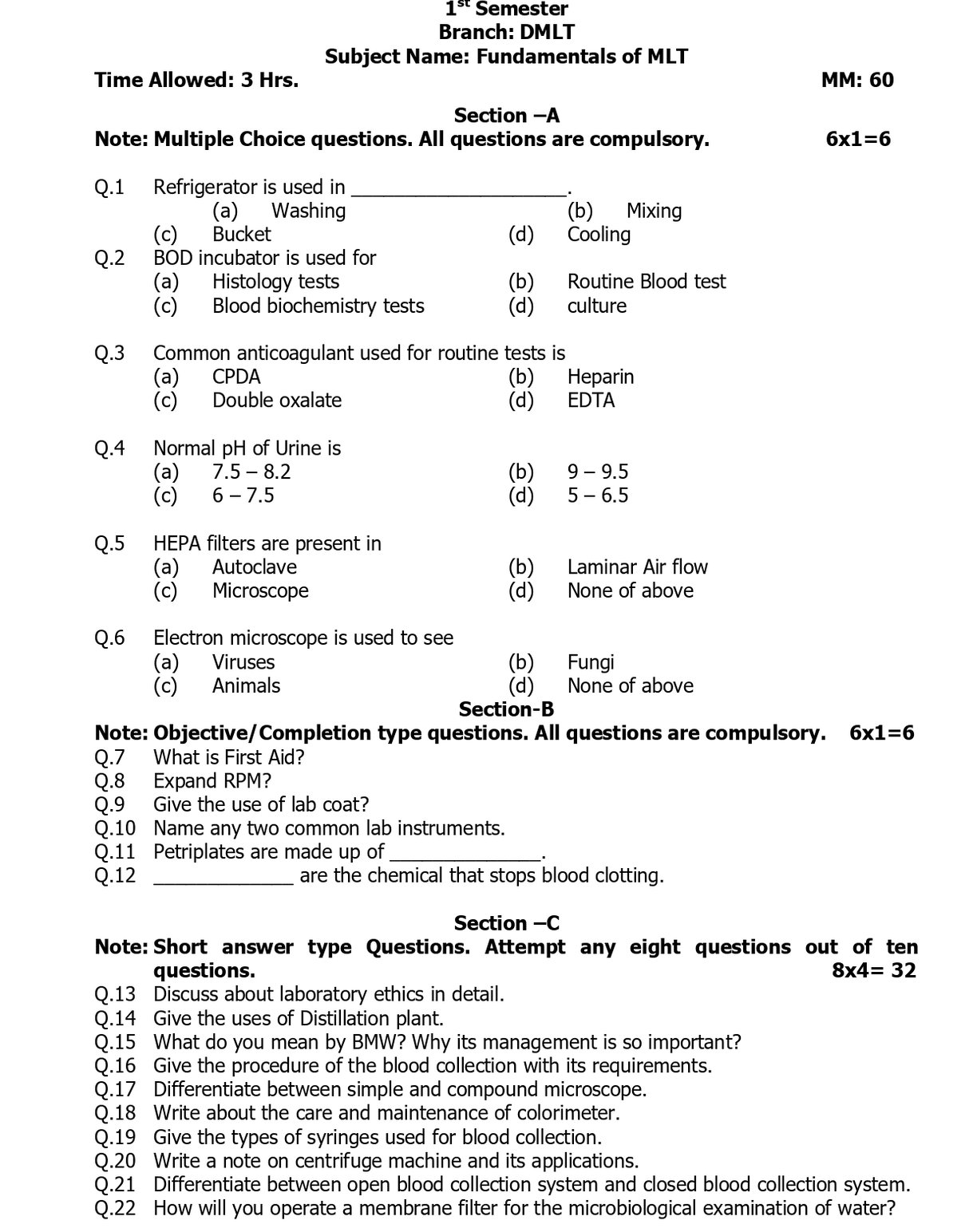HSBTE Fundamentals of MLT
HSBTE Fundamentals of MLT ID:221915 1st Semester, Question Paper July 23.
HSBTE QUESTION SOLUTION
Dr Pramila Singh
11/27/20232 min read




HSBTE Fundamentals of MLT ID:221915 1st Semester, Question Paper July 23.
1st Semester Branch: DMLT
Subject Name: Fundamentals of MLT ID:221915. Time Allowed: 3 Hrs. MM: 60
Section –A
Note: Multiple Choice questions. All questions are compulsory. 6x1=6
Q.1 Refrigerator is used in ____________________.
(a) Washing (b) Mixing (c) Bucket (d) Cooling. Ans: (d) Cooling
Q.2 BOD incubator is used for
(a) Histology tests (b) Routine Blood test
(c) Blood biochemistry tests (d) culture Ans: (d) culture
Q.3 Common anticoagulant used for routine tests is
(a) CPDA (b) Heparin (c) Double oxalate (d) EDTA Ans: (d) EDTA
Q.4 Normal pH of Urine is
(a) 7.5 – 8.2 (b) 9 – 9.5 (c) 6 – 7.5 (d) 5 – 6.5 Ans: (c) 6 – 7.5 Note: Normal pH of urine is 4.5 to 8.0. The average pH of urine is 6.
Q.5 HEPA filters are present in
(a) Autoclave (b) Laminar Air flow
(c) Microscope (d) None of the above. Ans (b) Laminar Air
Q.6 Electron microscope is used to see
(a) Viruses (b) Fungi (c) Animals (d) None of the above. Ans: (a) Viruses
Section-B
Note: Objective/Completion type questions. All questions are compulsory. 6x1=6
Q.7 What is First Aid?
Ans: First Aid refers to the immediate and initial care provided to an individual who has suffered an injury or illness. The primary goal of first aid is to preserve life, prevent the condition from worsening, and promote recovery.
Q.8 Expand RPM.
Ans: This is a unit of measurement used to express the speed of rotation. Rotation Per Minute
Q.9 Give the use of lab coat.
Ans: Lab coats serve several important purposes in laboratory and scientific settings. Some common uses of lab coats are personal protection, identification, limit the spread of contaminants, professional practice in scientific and medical settings, etc.
Q.10 Name any two common lab instruments.
Ans: Microscope and Centrifuge.
Q.11 Petriplates are made up of ______________.
Ans: Glass or Transparent Plastic. Petri plates are also known as Petri Dishes.
Q.12 _____________ are the chemical that stops blood clotting.
Ans: Anticoagulants
Section –C
Note: Short answer type Questions. Attempt any eight questions out of ten questions. 8x4= 32
Q.13 Discuss laboratory ethics in detail.
Q.14 Give the uses of the Distillation plant.
Q.15 What do you mean by BMW? Why its management is so important?
Q.16 Give the procedure of the blood collection with its requirements.
Q.17 Differentiate between simple and compound microscopes.
Q.18 Write about the care and maintenance of the colorimeter.
Q.19 Give the types of syringes used for blood collection.
Q.20 Write a note on the centrifuge machine and its applications.
Q.21 Differentiate between an open blood collection system and a closed blood collection system.
Q.22 How will you operate a membrane filter for the microbiological examination of water?
Section-D
Note: Long answer questions. Attempt any two questions out of three questions. 2x8=16
Q.23 Draw a well-labeled diagram of the microscope with its parts and give its working principles.
Q.24 Explain the principle of the biochemistry analyzer with its applications.
Q.25 Explain about physical and chemical balances.
Dr Pramila Singh
